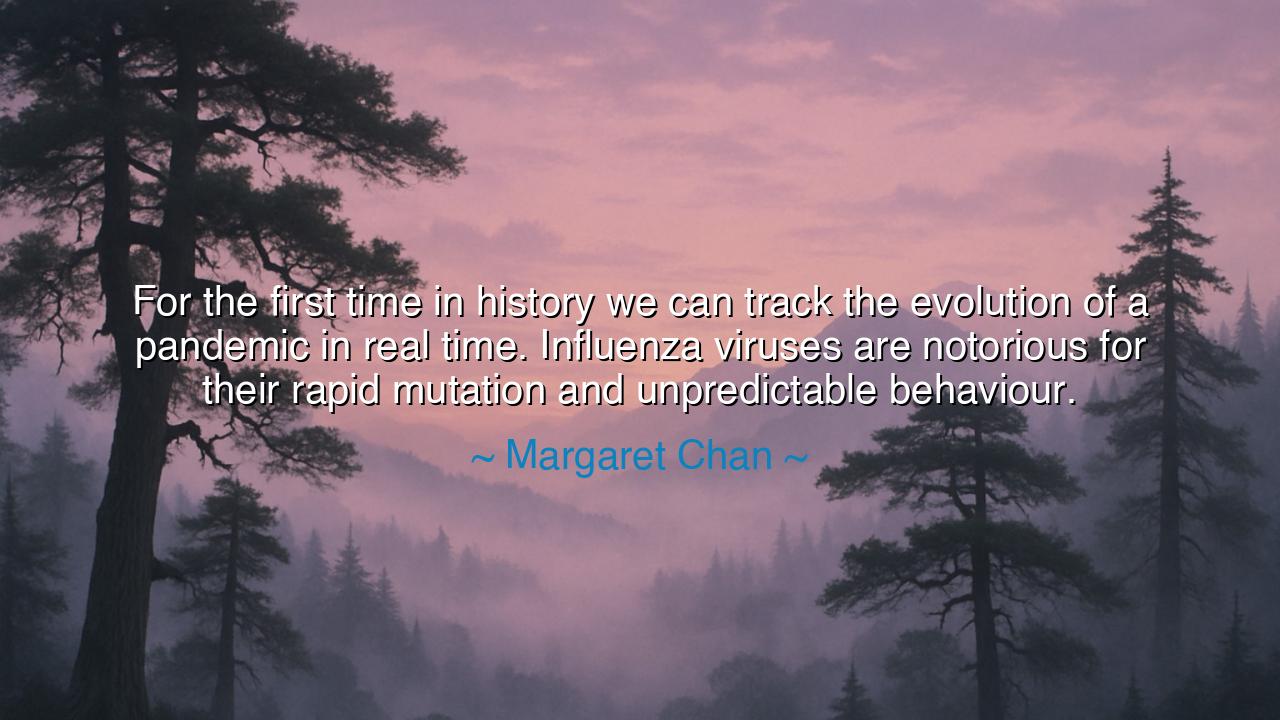
For the first time in history we can track the evolution of a
For the first time in history we can track the evolution of a pandemic in real time. Influenza viruses are notorious for their rapid mutation and unpredictable behaviour.






The physician and global leader Margaret Chan, former Director-General of the World Health Organization, once declared: “For the first time in history we can track the evolution of a pandemic in real time. Influenza viruses are notorious for their rapid mutation and unpredictable behaviour.” These words, spoken in an age of both peril and progress, capture the eternal tension between knowledge and nature, between the brilliance of human innovation and the relentless mystery of life itself. Chan’s insight is both triumphant and humble—she celebrates humanity’s newfound ability to observe what was once unseen, yet reminds us that mastery does not equal control. For even as we watch, the virus changes, slipping through our grasp like smoke through open fingers.
In her words lies a reflection on the fragility and wonder of existence. For thousands of years, humankind battled unseen enemies—disease, famine, plague—without understanding their true form. The Black Death swept across continents in the fourteenth century, its cause a mystery whispered through fear and superstition. Entire cities perished without knowing the nature of the darkness that devoured them. But now, in this modern age, science has become the torch that illuminates what once hid in shadow. We can map the very genetic code of an invader as it moves through the veins of humanity. We can see the patterns of spread, the subtle changes that once would have gone unnoticed until it was far too late. This, indeed, is a triumph of human reason—a victory of light over the long tyranny of ignorance.
Yet Chan warns that this triumph must be tempered with humility. For influenza, like all forces of nature, is alive in its own way—restless, ever-changing, unpredictable. It mutates swiftly, reshaping itself like a clever adversary that learns from every encounter. To believe we can fully contain it is folly; to understand its nature is wisdom. The ancients, too, knew this truth in their own form. They spoke of the gods of plague and pestilence, not merely as punishers, but as reminders of balance—that pride invites correction, that life’s fragility demands reverence. What Chan expresses in the language of science, the ancients would have called divine truth: that all power must walk hand in hand with humility.
In our time, we have witnessed this truth unfold before our eyes. When the COVID-19 pandemic emerged, the world watched in both awe and terror as the invisible was made visible. Maps flickered with data, numbers flowed like rivers through our screens, and the movement of death and recovery became a living tapestry of human struggle. For the first time in history, we could track the evolution of suffering itself—its rise, its retreat, its rebirth in new forms. Yet despite our unprecedented tools, fear and uncertainty still ruled our hearts. Information alone was not salvation; only wisdom, cooperation, and compassion could guide us through the storm.
Thus, Chan’s statement is not merely scientific—it is moral. It calls upon humanity to wield knowledge with care. To track a pandemic in real time is not only a marvel of technology but a test of our collective conscience. How shall we respond to what we see? With fear, or with unity? With denial, or with courage? For knowing is not enough; we must act wisely upon what we know. The data that tells us of mutation must also awaken in us the will to adapt, to heal, to protect one another.
There is an ancient tale from the time of Hippocrates, the father of medicine. During a plague, his students asked how they might save the most lives. He replied, “First, you must learn what you face. Second, you must face it together.” This is the essence of Chan’s wisdom. Our generation has achieved the first—we can now see the enemy clearly. But the second challenge remains: to act together as one body, not divided by nation or pride, but united by the shared breath of life itself.
So let this be the lesson: knowledge is light, but wisdom is the hand that carries it. We live in an age where truth can travel faster than disease itself, yet the heart must be as disciplined as the mind. To track the evolution of a pandemic is to witness the pulse of the world, to understand that we are bound by one fate and one fragility. Let us use this power not for fear, but for foresight; not for blame, but for balance. For as Margaret Chan reminds us, the gift of real-time knowledge is also the burden of responsibility—to see clearly, to act justly, and to remember always that even in mastery, we remain humble before the vast intelligence of nature.






AAdministratorAdministrator
Welcome, honored guests. Please leave a comment, we will respond soon